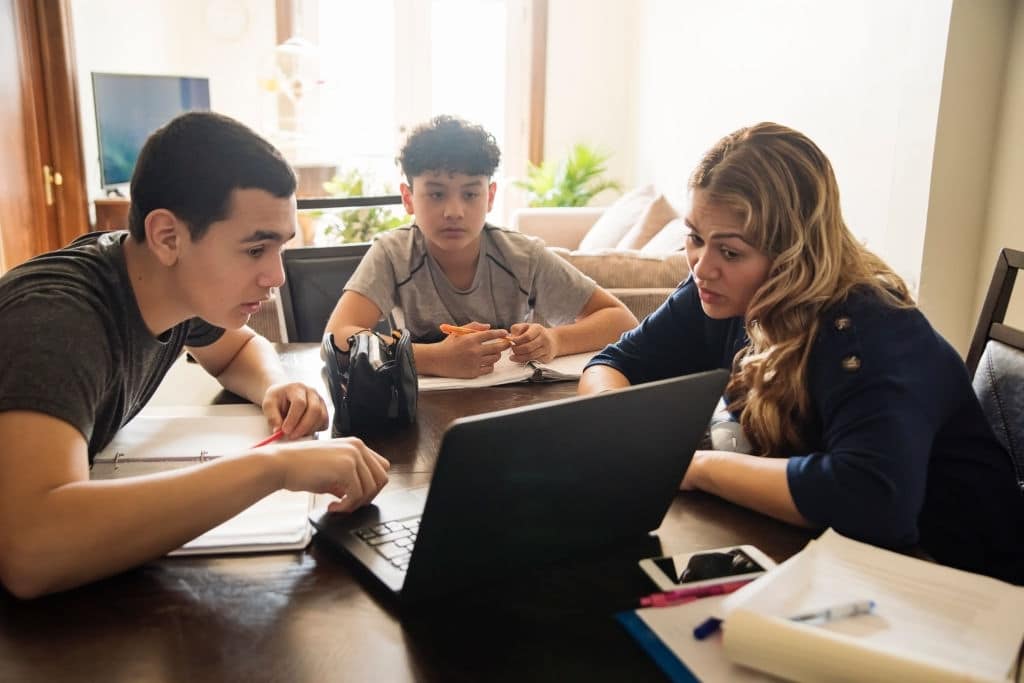 When your child receives education without attending a formal school governed by the state, it’s called ‘Homeschooling’. A child is taught by the parents and maybe even an external tutor who may come to your home and teach them.
When your child receives education without attending a formal school governed by the state, it’s called ‘Homeschooling’. A child is taught by the parents and maybe even an external tutor who may come to your home and teach them.
The reasons to opt to homeschool may be different, e.g., children may have a particular anxiety disorder and may not mix in well with the other students at school, he/she may be having a condition or an ailment that doesn’t allow him/her to be as physically active as is required by a physical school, or simply the parents don’t want a child to have the one-on-many experience of learning and have lost faith in the conventional methods of learning exercised in a regular school.
In some instances, Homeschooling can be seen as a means to escape societal problems like bullying, ragging, etc. But Homeschooling should be looked at as a way to learn something rather than solely as a means to escape a particular problem.
How Does Homeschooling work?
An inevitable question often pops into one’s mind, ‘Don’t homeschool kids have to go to a physical school’? The answer to this question is complex. For the most part, if a student has well-educated parents, then theoretical subjects may not pose a threat to Homeschooling’s homely comfort.
A one-on-one experience is a certified better way of learning academic subjects when a teacher is available right there and then to explain all of the doubts that may pop up in a child’s mind.
However, in subjects that require guidance through laboratory-like sciences, things may get a bit tricky. Parents may need the assistance of a government-certified laboratory, which is where schools outshine Homeschooling. However, parents may seek help from a school or specific organizations in such cases.
The Benefits of Homeschooling
When a child can learn something with a one-on-one approach, things get a lot easier.
First of all, as stated earlier, when a child gets special attention from the tutor, he/she may pick up concepts at a faster pace. Also, doubt clearing sessions become a lot easier; let us explain with an example. A single teacher teaching a class of 40 students in a 50-minute session can only clear so many issues.
Subject clarity may be sacrificed, and core concepts will not be as clear; of course, a student with initiative will stop at nothing to clarify doubts that may spring up in their minds, but often young minds lack this initiative.
This is where Homeschooling can eclipse one-on-many classroom education. Parents may take their wards on a personal excursion to museums, galleries, and monuments. A child may have hands-on experience with the exhibits, rather than having to wait for turns.
The Disadvantages Of Homeschooling
As a home tutor, the advantages of Homeschooling don’t come without their fair share of disadvantages. If you are the one in charge of teaching your ward at home, then you may find your personal, as well as social life, fleeting away. A Home Tutor has to accompany the child during the tutoring sessions, which torch through a good chunk of the 24 hours in a day.
A Homeschooled child may find himself lacking in the professional tools of a laboratory or the extravagance that comes with a gymnasium or a playground fitted according to a spirited individual’s needs. They may miss out on events that are limited only to a school, such as prom nights, inter-school events, and even club activities, which help them acquire team-building and cooperation qualities.
Moreover, a parent teaching or Homeschooling, a child may be well-versed in a particular subject but may find themselves lacking in another matter, e.g. A parent may be good in chemistry but not as acquainted in a linguistic subject like French or Spanish. This is where professional help can be of great assistance to the student.
A student may face social stigma, i.e., other parents or even children may find it weird being homeschooled. They may not embrace the fact that a homeschooled child can perform as well as the conventionally taught students.

Why Seeking Professional Help Matters?
As we stated earlier, a homeschooled individual doesn’t have access to professional equipment. The parents might find their wards lacking in some subjects and might not be aware of some topics that exist and are vital to their academic growth. This is where professional help comes in.
A specific homeschool aid organization may have specially crafted development kits that provide unique access to DIY projects, which help evaluate the students’ mechanical skills at home. Access to special clubs and team-building activities will help your child get that exposure that isn’t accessible through a homeschooling program.
Teachers professionally trained in the linguistic arts can help your child grasp tough subjects like foreign languages such as French and or Spanish way more easily and more comprehensively.
A tutor specializing in a particular subject can be a crucial aid to a homeschooling program. Tried and tested professional teaching methods are sure to give your children that extra edge while providing the same one-on-one experience.
Conclusion
The well-being of their child is of paramount importance to a parent. While being a safer and personalized way of education, we cannot turn a blind eye to the cons that come attached to Homeschool. Therefore, a parent must add a touch of professionalism and seek assistance from homeschool aids that will help your ward with the education they deserve.



